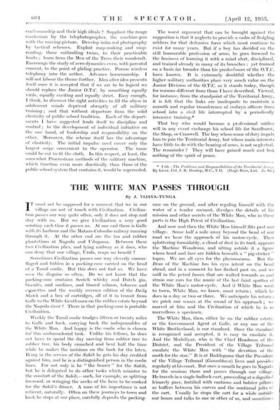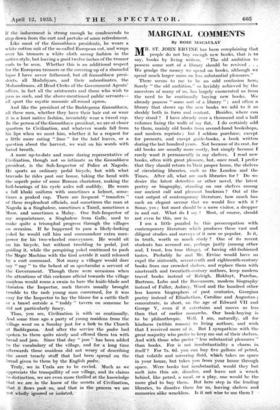THE WHITE MAN PASSES THROUGH
By J. VIJAYA-TUNGA IT must not be supposed for a moment that we in our village are out of touch with Civilization. Civiliza- tion passes our way quite often, only it does not stop and stay with us. But we give Civilization a very good scrutiny each time it passes us. At one end there is Galle with its harbour and the Matara-Colombo railway running through it. At the other end are the tea and rubber plantations at Nagoda and Udugama. Between these two Civilization plies, and lying midway as it does, who can deny that our village, Urala, reaps no benefit ?
Sometimes Civilization passes our way cleverly camou- flaged and hidden in a packing-case carried on the head of a Tamil coolie. But this does not fool us. We have seen the disguise so often. Do we not know that the packing-case contains Scotch whisky and Dutch gin, biscuits, and sardines, and tinned salmon, tobacco and cigarettes and the weekly oversea edition of the Daily Sketch and a box of cartridges, all of it in transit from Galle to the White Gentleman on the rubber estate beyond the Nagoda river ? There in that packing-case is portable Civilization. - Weekly the Tamil coolie trudges fifteen or twenty miles to Galle and back, carrying back the indispensables of the White Man. And happy is the coolie who is chosen for this ambassadorial task. Unlike his fellows, he does not have to spend the day moving from rubber tree to rubber tree, his body crouched and bent half the time while he makes the incisions on the bark for the latex. Being in the service of the Sahib he gets his day credited against him, and he is a distinguished person in the coolie lines. For not only is he " the bearer " for the Sahib, but he is delegated to do other tasks which minister to the comfort of the Sahib,—such, for example, as splitting firewood, or wringing the necks of the hens to be .cooked for the Sahib's dinner. A man of his importance is not reticent, naturally. Often on these journeys to town and back he stops at our place, carefully deposits the packing- case on the ground, and after regaling himself with the water of a tender coconut, divulges the details of his mission and other secrets of the White Man, who in these parts is the High Priest of Civilization.
And now and then the White Man himself flits past our village. Some half a mile away beyond the bend of our road we hear the approach of his motor-cycle. Then spluttering formidably, a cloud of dust in its trail, appears the Machine Wondrous, and. sitting astride it a figure whose head and face are hidden beneath a " pig-sticker " topee. We are all eyes for the phenomenon. But the Deus of the Machine has his eyes intent on the bend ahead, and in a moment he has flashed past us, and we sniff in the petrol fumes that are wafted towards us and strain our ears for the music of the last faint sputter of the White Man's motor-cycle. And if White Man went to town, White Man, we know, must return ; which he does in a day or two or three. We anticipate his return ; we prick our senses at the sound of his approach ; we marvel at him and the Civilization of which he is so marvellous a specimen.
The White Man, then, either he on the rubber estate. or the Government Agent at Galle, or any one of the White Brotherhood, is our standard. Once the standard is recognized and accepted, it is easy to emulate it. And the Mudaliyar, who is the Chief Headman of the District, and the President of the Village Tribunal emulate the White Man with " the devotion of the moth for the star." It is at Baddegama that the President of the Village Tribunal (Gansabhava) lives and presides regularly at his court. But once a month he goes to Nagoda for the sessions there and passes through our village. He travels in a single-bullock-cart, proceeding at a dignified leisurely pace, fortified with cushions and bolster pillows as buffers between his curves and the continual jolts of the cart. Usually he stops the cart for a while outside our house and talks to one or other of us, and sometimes if the inducement .is strong enough he condescends to step down from the cart and partake of some refreshment.
Like most of the Gansabhava presidents, he wears a white cotton suit of the so-called European cut, and wraps over his trousers a white cloth sarong fashion in the native style, but leaving a good twelve inches of the trouser ends to be seen. Whether this is an additional respect for the European trousers or the covering op.-of a shameful` lapse I have never fathomed, but all Gansabhava dents, all MudaByars, and their subordinates, the Muhandirams, all Head Clerks of the Government Agents' offices, in fact all the aristocrats and those who wish to pass as such, and the above-mentioned public servants— all sport the mystic masonic all-round apron.
And like the president of the Baddegama Gansabhava, all these men, whether they have their hair cut or wear it in a knot native fashion, invariably wear a tweed cap. In the person of the Gansabhava president, we are at closer quarters to Civilization, and whatever words fall from his lips when we meet-him, whether it be a request for a little more eating " lime " for the betel leaves, or a question about the harvest, we wait on his- words with bated breath.
A more up-to-date and more daring representative of Civilization, though not so intimate as the Gansabhava president, is the Sub-Inspector of Police at Nagoda. He sports an ordinary pedal bicycle, but with what bravado he rides past our house, taking the bend with the superb poise of some Roman charioteer, making the ball-bearings of his cycle axles roll audibly. He wears a full khaki uniform with sometimes a helmet, some- times a peaked cap. There are frequent " transfers " of these resplendent officials, and sometimes the man at Nagoda is a Singhalese, sometimes a Tamil, sometimes a Moor, and sometimes a Malay. One Sub-Inspector of my acquaintance, a Singhalese from Galle, used to make quite a triumphal progress through the villages on occasion. If he happened to pass a- likely-looking yokel he would call him and commandeer extra man- power for his two-wheeled conveyance. He would sit on his bicycle, but without troubling to pedal, just guiding it, while the perspiring yokel continued to push the Magic Machine with the God astride it until released by a curt command. Not many a villager would dare say " nay " to the behest of so spectacular a servant of the Government. Though there were occasions when the attentions of thiS cocksure official towards the village maidens would rouse a swain to bare the knife-blade and threaten the Inspector, such threats usually brought trouble to the rash young man concerned, for it was easy for the Inspector to lay the blame for a cattle theft or a brawl outside a " toddy " tavern on someone he did not particularly fancy.
Thus, you see, Civilization is with us continually. And some time ago a party of young maidens from the village went on a Sunday just for a lark to the Church at Baddegama. And after the service the padre had spoken to them quite nicely and offered them tea with bread and jam. Since that day " jam " has been added to the vocabulary of the village, and for a long time afterwards those -maidens did not weary of describing the sweet treacly stuff that had been spread on the bread given to them by the English padre.
Truly, we in Untie are to be envied. Much as we appreciate the tranquillity of our village, and its claims to distinction, we are even more thrilled at the knowledge that we are in the know of the secrets of Civilization, that it flows past us, and that in the process we are not wholly ignored or isolated.



















































 Previous page
Previous page